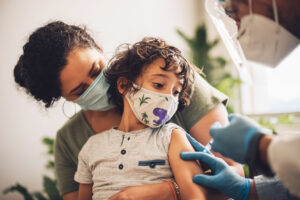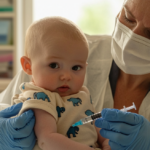 Depresja u dzieci – objawy, przyczyny, leczenie /fot. wizualizacja utworzona przy pomocy AI
Depresja u dzieci – objawy, przyczyny, leczenie /fot. wizualizacja utworzona przy pomocy AI
Depresja u dzieci – objawy, przyczyny, leczenie
Spis treści:
Czym jest depresja u dzieci i młodzieży?
Depresja u dzieci i młodych ludzi przebiega inaczej niż u dorosłych. Utrudnieniem na drodze do diagnozy jest przede wszystkim naturalny dla rozwoju dzieci stan ich emocji. Może też być mylona z innymi zaburzeniami – nadpobudliwością, wycofaniem, ADHD czy zaburzeniami odżywiania.
Na depresję mogą cierpieć zarówno dzieci spokojne i wycofane, jak i hałaśliwe, agresywne i pobudzone. Choć objawy depresji nie różnią się zanadto u dorosłych i dzieci, obserwuje się jednak, że maski depresji u dzieci i nastolatków często przybierają postać agresji i zwiększonej drażliwości. Nastolatkowie z kolei w większym stopniu zagrożeni są ryzykiem zachowań autoagresywnych i samobójczych.
O ile krótkotrwałe, trwające kilka godzin albo dni zaburzenie nastroju u dziecka nie powinno nas nadmiernie niepokoić, o tyle, jeśli taki stan utrzymuje się dłużej niż 4 tygodnie, nie powinno się go lekceważyć.
Jakie są objawy depresji u dzieci? Czym są maski depresji u dzieci?
Objawami depresji u dzieci są:
- smutek,
- spadek energii i zmęczenie,
- zaburzenia koncentracji uwagi,
- rezygnacja z zainteresowań i ulubionych aktywności,
- poczucie braku sensu życia,
- niska samoocena,
- poczucie winy,
- krytycyzm wobec siebie lub zbyt duży perfekcjonizm,
- lekceważenie codziennych obowiązków,
- brak dbałości o wygląd,
- ucieczka w świat internetu,
- objawy somatyczne,
- nawracające myśli o śmierci i odebraniu sobie życia,
- bezsenność i zmiany w dotychczasowym rytmie dzień-noc.
Depresja dziecięca często idzie w parze z zaburzeniami lękowymi. Jak oceniają specjaliści, doświadcza tego od 30 do 70 proc. dzieci z depresją.
Ważną różnicą w przebiegu choroby są nieco inne maski depresji. Dziecko może być duszą towarzystwa, największym szkolnym chuliganem, arogantem, a w tle tych zachowań także może być depresja.

Depresja u dziecka – objawy w szkole i w domu
U dzieci młodszych depresja częściej manifestuje się objawami somatycznymi. Dzieci skarżą się na ból brzucha lub głowy, nie mają apetytu, izolują się od rówieśników, nie lubią opuszczać domu, odmawiają pójścia do przedszkola czy szkoły. Niekiedy depresja przynosi zachowania skrajnie inne: spokojne i ugodowe dotychczas dziecko zaczyna reagować złością i histerią na błahe wydarzenia, urządza sceny, awanturuje się, świadomie niszczy swoje relacje z otoczeniem. U dzieci młodszych częściej występuje płaczliwość i skłonności do rozpaczy czy cofanie się w rozwoju. Wśród objawów somatycznych nierzadko obserwuje się także moczenie nocne.
U nastolatków z depresją przeważają smutek i apatia, ale często także drażliwość, kłótliwość i arogancja, którą otoczenie interpretuje jako „buzowanie hormonów”. W wielu przypadkach to duży błąd, bo za fasadą agresji i krzykliwości kryją się myśli samobójcze i niebezpieczne dla zdrowia i życia eksperymenty, np. z jedzeniem.
Nastolatki w depresji często też wagarują, przestają się uczyć, a złe oceny nie motywują ich do pracy. Porzucają też swoje zainteresowania, większość czasu spędzając w domu, przed komputerem lub śpiąc. Unikają też spotkań z rówieśnikami. Trudno zmobilizować nastolatka z depresją do pomocy w pracach domowych, nie sposób wyegzekwować sprzątnięcia pokoju czy zajęcia się swoimi sprawami. Nastolatek jest w stanie przespać większość doby albo w ogóle nie spać, koncentrując się przez wiele godzin na aktywnościach internetowych. Nastolatki tracą zainteresowanie swoim wyglądem, uważają, że są do niczego, oceniają się przesadnie poniżej swoich możliwości.
Przyczyny depresji u dzieci – co może ją wywołać?
Trudno wskazać jednoznaczną przyczynę depresji. Zazwyczaj jest to kompilacja kilku różnych czynników. Mogą to być:
- czynniki genetyczne – dowiedziono, że depresja częściej dotyka dzieci, których rodzice chorują lub chorowali;
- czynniki biologiczne – zaburzenia hormonalne, zaburzenia działania neuroprzekaźników w mózgu;
- czynniki psychologiczne, takie jak brak odporności na stres, niska ocena swojej osoby, zaburzone relacje interpersonalne;
- czynniki środowiskowe – traumatyczne doświadczenia losowe, doświadczenie przemocy, śmierć kogoś bliskiego, konflikty rodziców, rozwód, problemy finansowe rodziny, choroba w rodzinie, alkoholizm i inne uzależnienia u bliskich, problemy w szkole.
Depresja u dziecka może być także konsekwencją braku zainteresowania ze strony rodziców. Towarzyszące depresji próby samookaleczeń czy próby samobójcze są rozpaczliwym wołaniem dziecka o zwrócenie na nie uwagi.
Jak rozpoznać depresję u dzieci? Testy i diagnoza u psychologa dziecięcego
W wielu przypadkach do diagnozy dochodzi dopiero wtedy, kiedy wydarzy się coś złego – dziecko targnie się na swoje życie lub zrobi coś nieakceptowanego społecznie. Niekiedy inicjatywa wychodzi ze szkoły, odnotowującej nagminne nieobecności czy nietypowe zachowanie dziecka. Bywa, że wyraźna i utrzymująca się przez dłuższy czas zmiana zachowania i temperamentu dziecka zaniepokoi jego rodziców i zaczynają szukać wsparcia.
Depresja jest chorobą i może ją stwierdzić lekarz psychiatra. On także powinien wskazać drogę leczenia. Ogromnym wsparciem może być psycholog, u którego prowadzi się zazwyczaj leczenie łagodnej depresji. W depresji umiarkowanej i ciężkiej jedną z metod leczenia są leki przeciwdepresyjne.
Dzieci nie potrzebują skierowania do tych specjalistów. Do diagnozy depresji można doprowadzić w poradni zdrowia psychicznego, jednak czas oczekiwania na refundowane wizyty jest zazwyczaj bardzo długi. Pozostają wizyty prywatne u specjalistów. Niestety poważnym problemem w polskiej służbie zdrowia jest deficyt specjalistów zajmujących się młodszymi pacjentami. Brakuje też psychologów w szkołach, którzy w wielu przypadkach mogliby wesprzeć dzieci z trudnościami.
Od wielu lat wsparciem w diagnozie depresji są testy. U dorosłych wykorzystuje się test Becka, u młodzieży skalę depresji Kutchera. Nie mają one jednak zastosowania u dzieci młodszych. W ich przypadku pomocna może być skala CDI, czyli tzw. inwentarz depresji dziecięcej CDI (z ang. Children’s Depression Inventory). Zawiera on 27 punktów opisujących symptomy, a badane dziecko ma wskazać jedną z trzech odpowiedzi, do których przypisana jest odpowiednia liczba punktów. Suma tych punktów wskazuje występowanie depresji i jej nasilenie.
U młodzieży stosowana jest także Skala Depresji Kutchera dla Młodzieży (Kutcher Adolescent Depression Scale), gdzie badany ocenia nasilenie objawów (prawie nigdy, dość często, przeważnie, zawsze). W tym przypadku pytań jest 6, a suma zebranych punktów wskazuje na występowanie zaburzenia i jego nasilenie.
Warto jednak pamiętać, że testy są jedynie narzędziem pomocniczym i same nigdy nie będą podstawą diagnozy. Zawsze dokonuje jej lekarz podczas bezpośredniego spotkania z chorą osobą oraz rozmowy z rodzicami. Wskazane jest, by psychiatra i psycholog działali wspólnie, by doprowadzić do optymalnych rozwiązań.

Jak pomóc dziecku z depresją? Wsparcie rodziców i opiekunów
W leczeniu depresji fundamentalne znaczenie ma wsparcie otoczenia. Wielkie zadanie stoi przed rodzicami i opiekunami, którzy powinni wspierać dziecko, okazując mu pomoc i troskę, a także dbając o dobre relacje.
Podstawą jest uważność, poważne traktowanie problemów dziecka i obecność w jego życiu. Ważne jest także:
- okazywanie dziecku bezwarunkowej akceptacji,
- zapewnianie o miłości i poparciu,
- docenianie i chwalenie,
- powstrzymywanie się od krytyki, pouczania i oceniania,
- nie negowanie uczuć dziecka,
- taktowne zapewnienia o obecności i gotowości do pomocy,
- podjęcie działań – znalezienie wsparcia, konsultacja ze specjalistami,
- nie obrażanie się, kiedy dziecko zrani lub obrazi kogoś bliskiego,
- zadbanie o spokój w domu i zdrową dietę.
Na stronie Narodowego Funduszu Zdrowia zamieszczono zasady pierwszej pomocy emocjonalnej zebrane jako „cztery zetki”:
- Zauważ.
- Zapytaj.
- Zaakceptuj.
- Zareaguj.
Leczenie depresji u dzieci – metody terapeutyczne i farmakologiczne
Depresja jest chorobą i stwierdzić może ją lekarz psychiatra. On także powinien wskazać drogę leczenia. W depresji umiarkowanej i ciężkiej jedną z metod leczenia są zazwyczaj leki przeciwdepresyjne, które może dobrać i przepisać jedynie lekarz. Farmakoterapia powinna być jednak traktowana jako rozwiązanie doraźne i krótkotrwałe. Dzieci nie potrzebują skierowania do tych specjalistów.
Do diagnozy depresji można doprowadzić w poradni zdrowia psychicznego, jednak czas oczekiwania na refundowane wizyty jest zazwyczaj bardzo długi. Pozostają wizyty prywatne u specjalistów. Niestety poważnym problemem w polskiej służbie zdrowia jest deficyt specjalistów zajmujących się młodszymi pacjentami w państwowej służbie zdrowia. Brakuje też psychologów w szkołach, którzy w wielu przypadkach mogliby wesprzeć dzieci z trudnościami. Tymczasem, jak alarmuje WHO, depresja jest jedną z najpowszechniej diagnozowanych chorób na świecie.
Moje dziecko ma depresję – forum wsparcia dla rodziców
Dla wielu rodziców i opiekunów diagnoza depresji u ich dziecka jest ogromnym zaskoczeniem. Ciągle jeszcze w naszych rodzinach pokutuje przekonanie, że dzieci powinny być grzeczne, nie sprawiać kłopotów i jak najszybciej troszczyć się o swoje sprawy. Często nie zdajemy sobie sprawy, jak bardzo odbija się na dziecku zła atmosfera, awantury, trwanie w nałogach, niedostateczne wyjaśnienie problemów.
By odpowiedzialnie podchodzić do problemu, wszyscy powinniśmy poddać się psychoedukacji. Tylko wyposażeni w wiedzę o tej chorobie, jej objawach i skali zjawiska będziemy w stanie odpowiedzialnie pomóc dziecku. Dziecko, tak jak i dorośli, ma prawo do swoich emocji, które powinno móc wyrażać bez obawy wyśmiania czy lekceważenia. To najważniejsze lekcje, jakie powinni odrobić wszyscy wychowujący dzieci, zarówno w domu, jak i w placówkach opiekuńczych i edukacyjnych.
Diagnoza depresji u dziecka często jest odbierana przez rodziców jako czerwona kartka i porażka ich umiejętności wychowawczych. Nic bardziej mylnego – przyczyn wystąpienia depresji może być wiele, często leżą one poza zasięgiem i oddziaływaniem rodziców.
Tym bardziej warto zadbać o wiedzę, szukać wsparcia dla dziecka, ale także i dla siebie. Z pomocą mogą tu przyjść wszelkie internetowe narzędzia:
- dedykowane depresji strony internetowe,
- grupy wsparcia,
- profile w mediach społecznościowych.
W wielu tych miejscach można liczyć na przychylność i wsparcie całkowicie anonimowo. Wystarczy wpisać w wyszukiwarce internetowej: „moje dziecko ma depresję forum”, by przekonać się, jak wiele rodzin zmaga się obecnie z problemem depresji i jakie metody wsparcia były dla nich pomocne. Podajemy też adresy internetowe i ważne infolinie, zarówno dla młodych ludzi dotkniętych depresją, jak i ich bliskich:
Przydatne telefony:
116 111 – telefon zaufania dla dzieci i młodzieży Fundacji Dajemy Dzieciom Siłę
800 12 12 12 – dziecięcy telefon zaufania Rzecznika Praw Dziecka. Mogą dzwonić również osoby dorosłe, aby zgłosić problemy dzieci
800 12 00 02 – ogólnopolski telefon dla ofiar przemocy w rodzinie „Niebieska Linia”
112 – numer alarmowy w sytuacjach zagrożenia zdrowia i życia.
22 594 91 00 – środa i czwartek 17.00-19.00 – Antydepresyjny Telefon prowadzony przez Forum Przeciw depresji.
Pomocne linki:
https://www.nfz.gov.pl/aktualnosci/aktualnosci-centrali/poradnik-pacjenta-jak-pomoc-dziecku-w-kryzysie-psychicznym,8482.html
https://pacjent.gov.pl/aktualnosc/depresja-u-dzieci-i-mlodziezy
https://forumprzeciwdepresji.pl
https://www.stowarzyszenie-integracja.pl/documents/Nastoletnia%20depresja.pdf
Źródła:
- Dmitruk-Sierocińska K., Zaburzenia depresyjne – skąd się biorą i jakie sygnały wysyłane przez dzieci i młodzież powinny zaniepokoić dorosłych. Problemy Opiekuńczo-Wychowawcze, 616(1), 26-41, 2023.
- Lemańska W., O sile emocji pozytywnych. Zapobieganie depresji dzieci i młodzieży, Wydawnictwa Szkolne i Pedagogiczne, Warszawa 2005.
- Raczkowski A., Depresja dzieci i młodzieży – zjawisko i perspektywy pomocy, Wychowanie w Rodzinie” t. XVI 2/2017.
- Skala Depresji Kutchera dla Młodzieży (Kutcher Adolescent Depression Scale) (LeBlanc i wsp. 2002, Mojs i wsp., 2015).








































